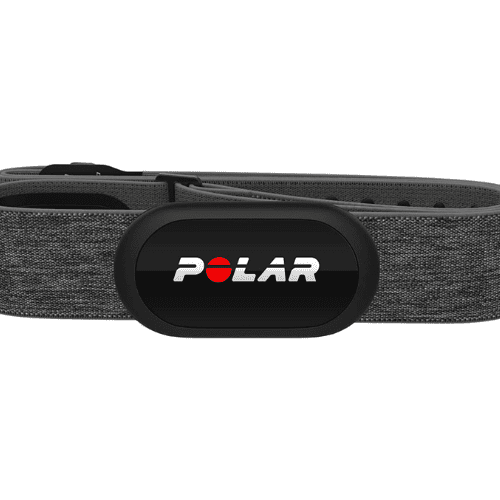Apple Watch Ultra Heart Rate Accuracy Test (vs Polar H10)

The Wearable Guy is powered by readers. By clicking on links within this page, we may get an affiliate commission at no extra cost to you.
I tested the Apple Watch Ultra vs Polar H10 chest strap for heart rate accuracy and you may be surprised at the results.
It has long been known that watch sensors struggle to match the accuracy of chest strap sensors. However, technology is rapidly improving and some watches may already be as capable as chest straps.
Related reading: check out our full review on the Ultra 1 and Ultra 2.
The objective of this test was to use real data to determine the accuracy of the Apple Watch Ultra heart rate monitor vs Polar H10 chest strap.
Polar is the gold-standard when it comes to heart rate measuring, outside of a laboratory setting. This is why we used the H10 as the benchmark to determine the Ultra’s accuracy.
The Test
I wet the electrodes on the Polar H10, snugged up my Apple Watch Ultra, then jumped on a Concept2 RowErg for 20 minutes.
Throughout this test I stopped every 5 minutes for 45 seconds. The reason for this was to test how responsive the Apple Watch was compared to the Polar chest strap.
The Results
The Apple Watch Ultra put on quite the show, putting some serious pressure on the Polar H10, and all other chest strap monitors.
Here is a chart of the Apple Watch Ultra vs Polar H10 heart rates during my 20 minute row. The Ultra is shown in red, while the H10 is blue.

As you can see the Apple Watch was neck and neck with the Polar H10 the entire test. There were a couple times when the Ultra would lead by about a second, and other times the H10 would lead for about a second.
The average heart rate and max heart rate were exactly the same for the Ultra and the H10 at 148 and 164, respectively.
It is safe to say the Apple Watch Ultra is as accurate as the Polar H10 chest strap.
You can purchase the Apple Watch Ultra and Polar H10 below.
Wrist vs Chest Strap Heart Rate Monitors
Wrist Heart Rate Monitors
Have you ever noticed the red and green lights flashing on the back of your watch? This is the Apple Watch’s PPG sensor in action. This sensor uses light from little LEDs to measure your heart rate.
The LEDs rapidly flash every 1-2 seconds and measure the amount of light that is absorbed by your skin. It then uses this information to determine your heart rate with surprising accuracy.
Chest Strap Heart Rate Monitors
Chest straps ECG sensors measures the electrical signals that originate in your heart. As your heart beats, it sends out these signals and the Polar H10 ECG sensors collect this data to determine your heart rate.
These type of heart rate monitors have long been the standard due to their nearly perfect accuracy (96-99% depending on the exercise).
ECG chest straps are also known for being extremely responsive because you wear them right on your chest. This allows them to get signals from your heart very quickly, which helps when doing exercises where your heart rate fluctuates often.
Limitations
It is important to note that this test was only done once, and on one person. The results may vary depending on the person and how well photo sensors work on their skin.
Another limitation is that this test was only done on a single 20 minute row. Results will certainly vary depending on the exercise.
You will likely see more accurate readings from exercises where your wrist is stationary, such as cycling. Similarly, you may also have less accurate for readings during exercises such as martial arts or Crossfit.
Apple Watch Ultra vs Polar H10 Key Takeaways
It’s pretty clear that Apple has set the new standard for wrist mounted heart rate monitors.
Chest straps once dominated the market, and they do still have their place for specific exercises, but Apple Watches are proving to be all that most people will need for basic heart rate monitoring.
Disclaimer: None of this is medical advice. If you have a health condition and rely on accurate heart rate readings, speak with your doctor whether or not an Apple Watch is suitable for you.
Related Articles:
How to Install Apps on Apple Watch (Updated for watchOS 10)
Are you looking to explore new functionalities or bring back previously deleted apps? This article provides a step-by-step walk-through for how to install apps on Apple Watch that are running watchOS 10 or newer, as well as how to troubleshoot some common...
Apple Watch Ultra Comparison: Analyzing Step Consistency, Calories, Battery Health, and Performance Metrics
I wore the Apple Watch Ultra 1 and Ultra 2 from a full charge until they both died. Throughout this Apple Watch Ultra comparison, I gathered an analyzed various data-points such as step count, calories burned, and battery life. This hands-on information is could be...
I Put the Apple Watch Ultra 2 Battery to the Test in Multiple Scenarios. Here’s what I found
Key Ultra 2 Battery Insights: Max Battery Life Potential: By turning off 'Always On Display', 'Raise to Wake', and forgoing sleep usage, you can achieve a 20% longer battery life, reaching up to 84 hours. Features Impact: Using the watch for sleep, having the 'Always...

by Ken Lynch
Ken is a Healthcare Data Analyst, owner, sole contributor to The Wearable Guy, and overall tech nerd.





